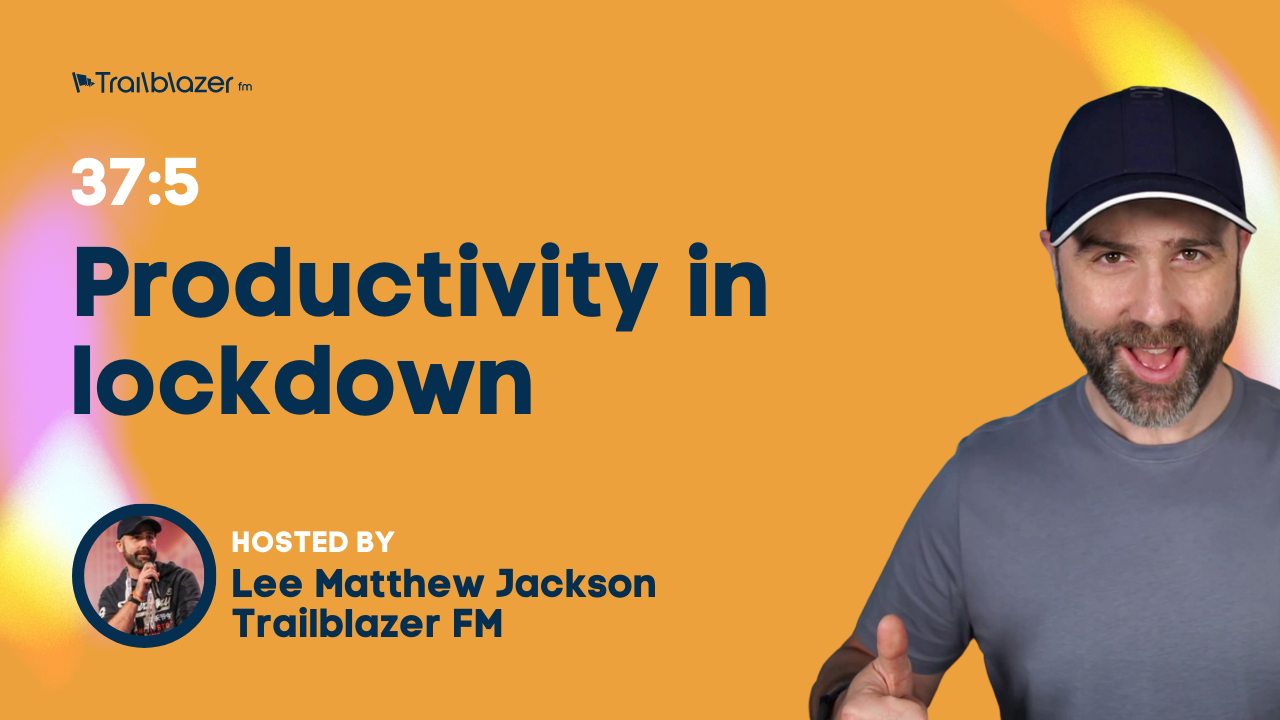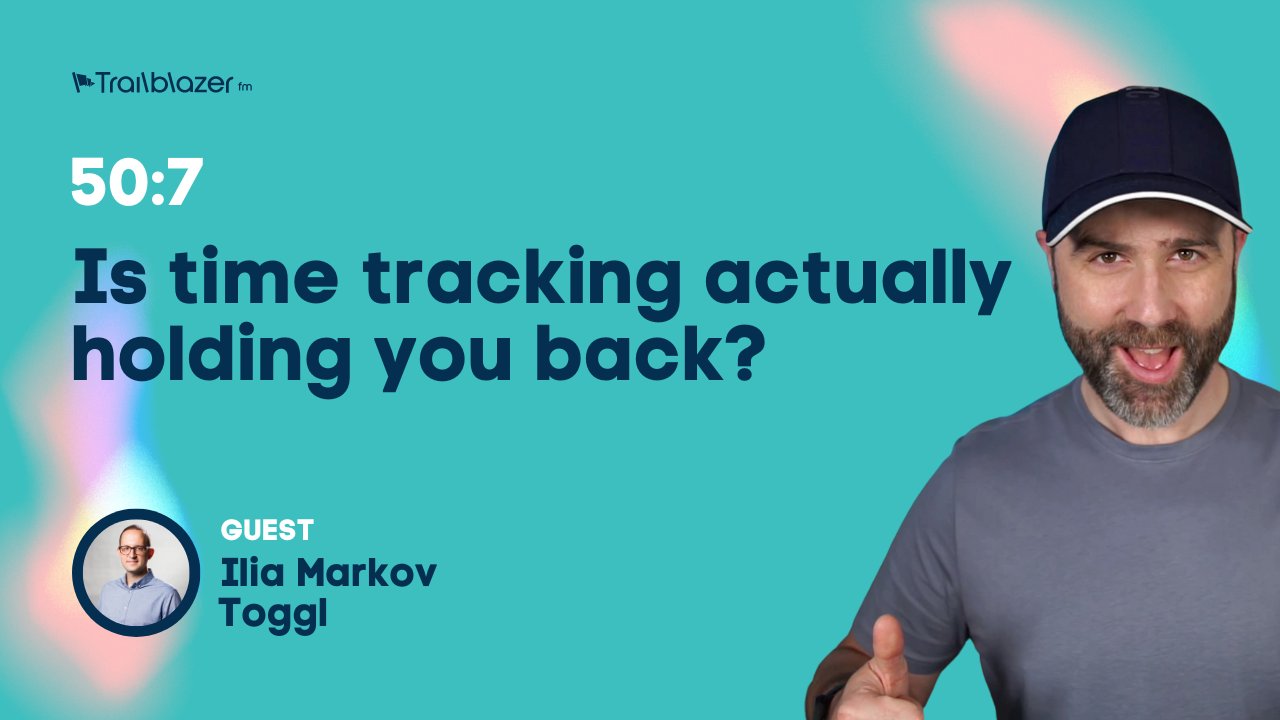
37:5 How to be productive during lockdown
For those folks used to the office environment, life has been turned upside down. No take out coffee, no chatting at the water cooler, no podcast on the commute and no cheesy banter being thrown across the room.
For those folks used to the office environment, life has been turned upside down. No take out coffee, no chatting at the water cooler, no podcast on the commute and no cheesy banter being thrown across the room. Seeing the virtual head and shoulders of those you’ve grown close to over the years is not the same as being together.

Here in the UK we are going through our second nationwide lockdown. I’ll be honest with you… I am finding this one really difficult. I miss my team and getting work done is often more of a challenge. Over the years of managing my mental health, I’ve leant heavily on some tried and true practices to keep productive despite these trying times.
Here are the core practices we engage with to ensure a happy, healthy and productive team:
- Develop a morning routine
- Establish daily catchups
- Set up a group chat
- Encourage virtual office hours
- Set working hours
- Communicate the weekly goals
- Daily reports / accountability
Further resources
How to stay motivated all day – click here
Transcript
Welcome to The Agency Trailblazer podcast, this is your host, Lee. On today’s show, we are talking productivity during lockdown. That’s either for you on your own or for you and your team. This podcast is sponsored by Cloudways, our hosting platform of choice. They have a fantastic interface allowing us to manage multiple projects across multiple cloud platforms. You can check that out over on cloudways.com.
Let’s get stuck into the show. Here in the UK, we are in a nationwide lockdown and our team are distributed across all of their homes. To be frank, I really miss that office environment, getting to hang out that banter, those conversations, grabbing a takeout coffee, going out for walks with colleagues, engaging in brainstorming sessions, you name it. I miss it. I’m a big believer in being together. So during this lockdown, how can I ensure that I am productive being here at home alone? And how can I ensure my team remain motivated, engaged and most importantly, support the mental health of everybody in our business?
What we did was met together and discussed all of the things that we miss about a physical office. It was those conversations, those brainstorming sessions, those ad hoc walks, the coffees together, the food together, the banter, all of those things. And it was really helpful to list those out and see how could we virtually replace those? How could we get the same or similar outcomes whilst we are all stuck at home.
Now, I do believe that we are a pretty normal group of people here at Agency Trailblazer, and I do believe the things we’ve come up with will work for most, if not all agencies. But I would encourage you to have a conversation with your team members and find out what it is they miss and what practices can you put in place. And, of course, feel free to steal any or all of these ideas that I’m going to share with you in today’s episode.
The first for all of us is to develop a morning routine. The temptation with working from home is to sleep in and then rush down to your desk to get started. And we miss out on those daily routines that we’ve established when we’re commuting into the office. It’s that office commute that gets us into work mode. Whether you realize it or not, you’ll have developed some habits and some routines that get your mind ready for the day. My own routine included some meditation, some reading, some exercise, getting breakfast, and then the travel to work included listening to a podcast or to some music. By the time I arrived at the office and powered up my laptop, I was ready for the day.
So how could I develop a morning routine that closely replicates what I’ve established and helps me get into that work mode. I’ve encouraged all of my team to look at their commute and see how they can replicate some form of morning routine, giving them that process, that mindset shift before they crack on with the rest of the day.
Next, we’ve established a daily catch up. At eight a.m we all get together on Zoom and we go through what needs to be achieved. We ask how each other is doing, what each other is working on, how we can support each other. We update any projects that need updating, then we all crack on with the rest of the day. To follow that up, we’ve also set up a group chat and this is through Slack. So once that video call is over with, we can still continue the conversation throughout the day. This is where we can ask for help. We can share something that’s funny, that’s made our day. We can engage in a little bit of banter and most importantly, this helps us to feel connected. We know we have a space where we can reach out and the support will be there from our colleagues.
Now, nothing quite beats being able to call across the office, which is why we also encourage virtual office hours. What we do here is all jump on a Zoom at some set times. We then just carry on working, but we’re all on video and we have our mics on. It’s a way of replicating an office environment. We can hear and see each other and we have that option to just call out to the room and ask a question and sometimes we may go a whole hour without saying anything to each other, but we can still do those knowing glances or smile at each other or just know that we are all together. And there’s just something really magical about those office hours.
Next, speaking of office hours, we encourage our team to work to the same times we worked at, at the office. We start at 8am, we have our lunch break at 12. We then carry on at 1:00 and work through until 4:00 p.m every day. Having massively changed the culture of our physical office to ensure that people weren’t staying at the office and not spending time with family. We want to ensure that we still continue to do that in the virtual setting. It’s really easy when you’re at home to get up early and start working. It’s also easy to continue to work past four o’clock and get things finished when really you should be having some of that downtime.
So we actively encourage and remind our team that we still have the set working hours, we don’t work weekends, we don’t get up super early to work. We don’t work super late. We have to maintain a work life balance, which will be good for everybody.
So far we’ve focused on creating routine, establishing an environment that is conducive to working together. But how can we ensure that the work actually gets done? I know for myself I will often stare out of the window for quite some time because it’s there. It’s right in front. I’m actually looking out of the window now, getting slightly distracted. How can I ensure that me and my team are going to continue to get the job done even when we are at our individual homes? And we do that in two ways.
At the beginning of each week, we establish the goals we have as a company. We list out the activities that we need to engage with and which team members will be owning those activities. We’ll then log that in our Slack in a pinned to do list so we can see that throughout the week and we can see the progress. This acts as a high level list rather than an in-depth project management system, but it gives us an overview of what we are all working towards and who is owning it. It means we can support each other, but importantly, it means we can be accountable. What we therefore do is at the end of each day, we submit a report to share what we have worked on and what goals we have been working towards.
That keeps us accountable. That ensures that we’re engaging in the activities that we are supposed to be engaging with and we are sharing and owning as a company all that we need to get done. We were doing this on a weekly basis in the office, but now that we’re at home, it really helps to do this daily. It’s focusing our minds on the work we need to get done, and it’s also ensuring that we are reaching out for the necessary help in an office environment. It’s far easier for Larissa say, to reach out to me and ask for some support there and then whereas working from home and not communicating for an entire week, things can get left behind.
So that daily report that’s coming in from each of us helps us all to understand where we’re at and helps us all understand how we can support each other. For example, just yesterday there was some content that Larissa needed from me. Normally she would have called across the room, I would have said something across the room, recorded a quick voice note or something for her. I saw the email. I was able to respond before I signed off and she had that information ready for the following day.
I would highlight that this is not to spy on your team or to make them feel they have to do work. These reports should correlate with the overall goals that we have each week as a company. I’m not expecting a minute by minute breakdown of what somebody has been up to, and I’m actually fine if somebody takes a bit of a break but still gets the job done. So I would caveat that with we are not looking to micromanage our staff. We’re actually looking to create an environment whilst we’re all working digitally that allows us to be open, to be honest, to be accountable and to be supportive of one another.
I get that none of what I’ve shared today is groundbreaking in any way, but we are acknowledging that working from home is different. It’s harder to get motivated. It’s harder to communicate. It can have a negative impact on your mental health. So these activities that we’re engaging with our effort to help improve that and to help support each other. So I’d encourage you, just like I said at the beginning of this episode, to meet with your team, find out what it is that you and your team are missing out on, and see what you folks can put in place to support one another.
So as we come in to land, let’s do the Lee Jackson recap. We recognized that working from home was going to be difficult. So we met and we discussed what do we miss from the physical office environment. We then made a list of activities we could engage with to help us. That included developing a personal morning routine to replicate that commute. It included establishing daily catch ups. We set up that group chat on Slack for banter, for conversation. We encouraged virtual office hours for us all to hang out together. We set those specific work hours to ensure that people weren’t getting up too early or working too late. We communicate those weekly goals and finally we do those daily reports for that accountability and for that support. What can you put into place for your business and for your team to continue to be a productive unit during lockdown?
I would love to know what your ideas are. Come and join us over in the Facebook group. You’ll find that over on trailblazer.fm/group and let us know what you and your team are doing to be productive.
If, like me, you do struggle with your mental health or you believe you are struggling now due to the lockdowns and this prolonged pandemic, can I encourage you to head on over to Big Orange Heart? They are a charity focused on supporting and promoting the positive wellbeing and the mental health within remote working communities. And right now, I believe we are all remote workers. That’s bigorangeheart.org. See if you can get involved in any way, you can join their community. You can listen to their podcast. And if you can, you can even support them financially just by hitting that big orange donate button over on bigorangeheart.org.
We hope to see you in the community, folks. If we don’t see you there, then let’s see you in next week’s episode.








